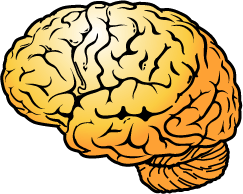


FAST BRAIN FACTS
| The human brain contains over 100 billion neurons | There are more neurons in the frontal lobe than any other lobe. |
| The surface area of the cerebral cortex is 2,500 sq. cm | Unconsciousness results if the brain is deprived of blood flow for more than 8-10 seconds |
| The cell bodies of neurons vary in diameter from 4-100 microns | A total of 400-500 ml of cerebrospinal fluid (CSF) is produced everyday |
Focus on Epilepsy
In the very near future I will have available for your study the intricacies of this relatively common and often misunderstood disease. The first set of documents is available for download (below).
Additional Resources
 One of the most comprehensive sites on the Net for patients with epilepsy.
One of the most comprehensive sites on the Net for patients with epilepsy.

Enter Neurology Room 2 through the door on the right 
Enter the special Dementia and Alzheimer's section by clicking on the arrow to the right.